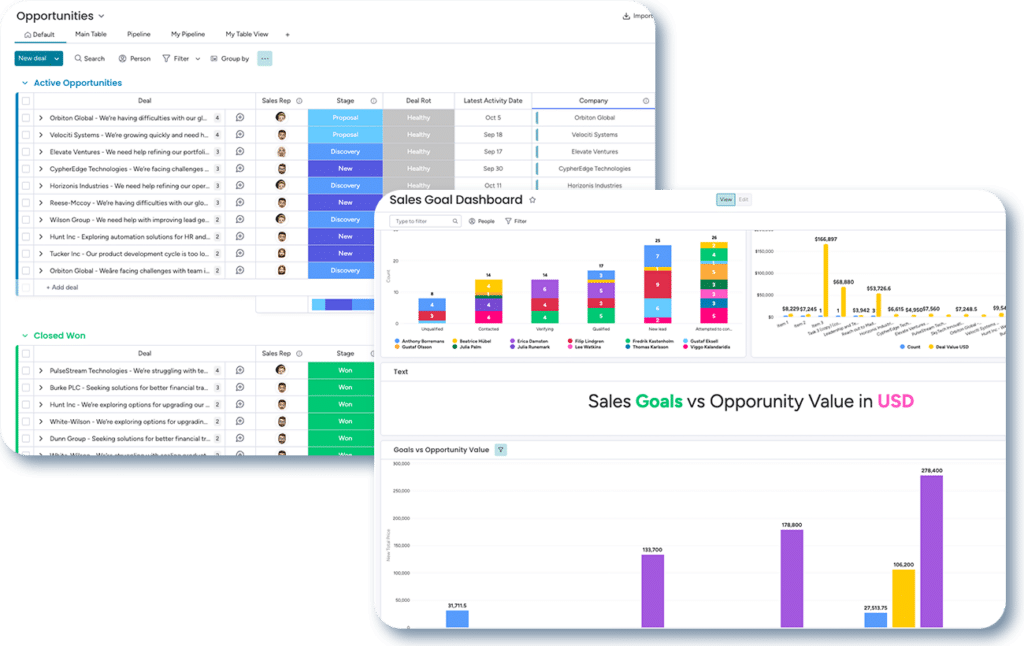Introduction
In today’s fast-paced digital landscape, the customer journey has evolved into a complex web of interactions, touchpoints, and experiences. Businesses striving to excel must not only understand this journey but also ensure it’s as seamless as possible. This is where the concept of creating a seamless customer journey with CRM integration becomes pivotal.
At the heart of a successful customer experience lies the ability to manage relationships effectively. Customer Relationship Management (CRM) systems have emerged as vital tools in this regard, offering businesses a way to track, analyze, and improve their interactions with customers. However, the true potential of CRM systems extends beyond mere data collection and management. The integration of CRM systems with other business tools can transform the entire spectrum of customer engagement, turning every interaction into an opportunity to delight and retain.
Creating a seamless customer journey with CRM integration is not just about implementing technology. It’s about weaving a fabric of connectivity across all customer touchpoints. This integrated approach ensures that every step of the customer’s journey, from initial contact to post-sale service, is smooth, personalized, and responsive.
In this article, we’ll explore the various facets of CRM integration and how it revolutionizes customer journey management. Whether you’re a small business owner, a marketing professional, or an IT expert, understanding the dynamics of CRM integration will empower you to create more meaningful, lasting relationships with your customers.
Understanding the Customer Journey
To effectively create a seamless customer journey with CRM integration, it’s essential first to understand what the customer journey entails. The customer journey refers to the complete experience a customer has with your business, from the moment they first become aware of your brand to their post-purchase interactions and beyond. This journey is unique for each customer but typically includes several key stages.
Stages of the Customer Journey
- Awareness: The initial stage where potential customers first learn about your business or product.
- Consideration: At this stage, customers evaluate your offerings, comparing them with competitors.
- Decision: The critical point where a customer decides to make a purchase.
- Retention: Post-purchase engagement aimed at maintaining a long-term customer relationship.
- Advocacy: When satisfied customers recommend your brand to others, effectively becoming brand ambassadors.
Each of these stages offers distinct opportunities and challenges. A well-integrated CRM system helps in identifying and capitalizing on these opportunities by providing insights into customer behaviours and preferences.
Challenges in Managing the Customer Journey
Managing the customer journey in today’s digital age comes with its set of challenges:
- Data Overload: With an abundance of customer data available, filtering out the noise to focus on what’s important becomes critical.
- Consistency Across Channels: Ensuring a consistent experience across various customer touchpoints, like social media, email, and in-person interactions, can be daunting.
- Personalization: Customers expect personalized experiences. Failing to provide this can lead to a disconnect in the customer journey.
- Adapting to Changing Behaviors: Customer preferences and behaviours are constantly evolving, necessitating a dynamic approach to customer journey management.
Creating a seamless customer journey with CRM integration is about overcoming these challenges. By effectively integrating CRM systems with other business tools, businesses can not only map out each stage of the customer journey but also respond to it in real time with personalized, consistent, and relevant interactions.
Omnitas Newsletter
Sign up for our monthly newsletter to stay up-to-date on our latest blog articles, videos and events!
Thank you!
You have successfully joined our subscriber list.
The Role of CRM in Enhancing Customer Experience
At the core of creating a seamless customer journey with CRM integration lies the pivotal role of Customer Relationship Management (CRM) systems. A CRM system is more than just a database of customer interactions. It is a powerful tool that, when used effectively, can significantly enhance the customer experience.
Overview of CRM Systems
- Definition: A CRM system is a technology used to manage all your company’s relationships and interactions with current and potential customers.
- Functionality: It helps with contact management, sales management, productivity, and more, acting as a single source of truth about your customers.
Benefits of Using a CRM for Customer Journey Management
Utilizing a CRM system offers numerous advantages:
- Improved Customer Insights: CRM integration provides deeper insights into customer behaviour and preferences, enabling more targeted and effective marketing strategies.
- Enhanced Communication: It ensures that every communication with a customer is informed and relevant, which is crucial in building strong relationships.
- Efficient Customer Service: By having all customer information in one place, CRM systems allow for quicker and more effective customer service, enhancing overall satisfaction.
- Personalized Experiences: With access to detailed customer data, businesses can tailor their offerings and interactions to meet the unique needs and preferences of each customer.
Centralizing Customer Information
- Single Customer View: CRM systems consolidate customer data from various touchpoints, providing a comprehensive view of the customer journey. This centralization is key to understanding and predicting customer needs and behaviours.
- Data-Driven Decision Making: Armed with a wealth of data, businesses can make more informed decisions, aligning their strategies with customer expectations and market trends.
Automating Customer Interactions
- Streamlining Processes: CRM integration automates routine tasks like customer follow-ups and data entry, allowing teams to focus on more strategic activities.
- Consistent Customer Engagement: Automation ensures consistent customer engagement, an essential factor in maintaining a seamless customer journey.
By integrating CRM systems into their business processes, companies are not just managing customer data. They are actively enhancing every interaction along the customer journey. This proactive approach to customer relationship management is crucial in today’s competitive marketplace, where customer experience often dictates the success or failure of a business.
Integrating CRM with Other Business Tools
Creating a seamless customer journey with CRM integration goes beyond the boundaries of the CRM system itself. It involves integrating the CRM with various other business tools, which amplifies its effectiveness and enhances the overall customer experience. This integration is key to achieving a holistic view of the customer and a more coordinated approach to customer management.
Importance of CRM Integration with Business Software
By integrating CRM with tools like marketing automation platforms, sales software, and customer service applications, businesses can have a more comprehensive view of the customer. This integration ensures that every customer interaction is informed by a complete history of the customer’s relationship with the company.
Integration allows for the seamless flow of data between systems, eliminating data silos and ensuring all departments have access to the same up-to-date information.
Practical Examples of CRM Integration
- Marketing and Sales Alignment: Integrating CRM with marketing tools ensures that leads generated are directly fed into the sales pipeline, improving lead management and nurturing.
- Enhanced Customer Support: Linking CRM with customer support tools enables support teams to access customer history and preferences, providing personalized and efficient service.
- Streamlined Internal Communications: Integration with internal communication tools facilitates better coordination between departments, ensuring a unified approach to customer management.
Enhancing Data Analysis and Reporting
- Informed Decision-Making: With CRM integration, businesses can aggregate data from various sources, providing valuable insights for more informed decision-making.
- Customized Reporting: Integrated systems allow for the creation of customized reports that offer a clearer understanding of customer trends and business performance.
Streamlining Workflows Across Departments
- Automated Workflows: Integration can automate workflows across different departments, reducing manual work and increasing efficiency.
- Consistent Customer Experience: Ensuring all departments have access to the same customer information leads to a consistent and seamless customer experience, irrespective of the customer’s touchpoint.
Integrating CRM with other business tools is not just about technological synergy. It’s about creating a unified platform that enhances every aspect of the customer journey. This integration is crucial for businesses looking to provide a seamless, personalized, and efficient customer experience.
Overcoming Common Challenges in CRM Integration
Integrating CRM systems with other business tools is essential for creating a seamless customer journey, but it often comes with challenges. Addressing these effectively can make the integration process smoother and more efficient.
Navigating Technical Complexities
The complexity of integration is a major hurdle. It involves dealing with technical details and ensuring compatibility between different systems. A clear strategy, prioritizing key integrations based on their impact on the customer journey, can simplify this process. Focus on integrating essential tools like email marketing platforms, sales tools, or customer service software first, and expand from there.
Ensuring Data Consistency
Inconsistencies in data across multiple systems can disrupt the customer journey. To prevent this, robust data management practices are essential. Establish and maintain data standards across all systems, and regularly update your data to keep it accurate and relevant. Consistent data is the backbone of a seamless customer journey.
Facilitating User Adoption
User adoption is critical to the success of CRM integration. Involve your team from the start, provide them with comprehensive training, and demonstrate the benefits of the integrated system. Continuous support and open communication are vital for encouraging adoption and addressing user concerns.
Adapting to Evolving Needs
The digital landscape and customer expectations are always evolving. An adaptable CRM integration strategy is necessary to keep up with these changes. Stay informed about the latest trends in CRM technology and customer relationship management, and be ready to evolve your strategies accordingly.
By tackling these challenges head-on, businesses can maximize the benefits of CRM integration. This not only improves operational efficiency but also ensures that the customer journey remains smooth, personalized, and aligned with the latest market trends.

Getting Started with CRM Integration
Embarking on the journey of creating a seamless customer journey with CRM integration can seem daunting, but with the right approach, it can be a smooth and rewarding process. Here are the essential steps to get started with CRM integration, ensuring you make the most of its potential.
Assessing Your Business Needs
The first step in CRM integration is understanding your business’s unique needs. What are the specific challenges you face in managing customer relationships? Which customer journey stages do you need to enhance? Assessing these needs helps in selecting a CRM system and integration tools that align with your business goals.
Choosing the Right CRM Platform
Selecting the right CRM platform is crucial. It should not only meet your current needs but also be scalable to adapt to future business growth. Factors like ease of use, customisation options, integration capabilities, and cost should be considered. Platforms like monday.com offer a versatile and user-friendly CRM that can be tailored to various business requirements.
Planning the Integration Process
A well-planned integration process is key to success. Outline the specific systems and tools you need to integrate with your CRM. Create a roadmap for the integration process, including timelines and milestones. Ensure that you have a clear understanding of the technical requirements and the resources needed.
Partnering with Integration Experts
For many businesses, partnering with integration experts can be a game-changer. We at Omnitas specialize in CRM integration, offering expertise and resources to ensure a smooth integration process. Our experts can provide valuable insights, assist with technical challenges, and help tailor the CRM system to your specific business needs.
Training and Supporting Your Team
Once your CRM system is integrated, training your team is crucial. Ensure they understand how to use the system effectively and how it benefits their daily tasks. Provide ongoing support to address any challenges and encourage adoption. If this task seems daunting, Omnitas’ team of experts are also here to help you and your team excel in your user adoption of the new software.
Continuously Monitoring and Improving
CRM integration is not a one-time task. It’s an ongoing process. Regularly monitor the system’s performance and gather feedback from your team and customers. Be prepared to make adjustments and improvements to ensure the CRM system continues to meet your evolving business needs.
By following these steps, you can effectively start your journey toward creating a seamless customer journey with CRM integration. This process will not only enhance your customer relations but also drive efficiency and growth for your business.
Conclusion
In the journey of digital transformation, creating a seamless customer journey with CRM integration stands as a critical milestone for businesses aiming to thrive in today’s competitive landscape. By integrating CRM systems with other business tools, companies can not only streamline their operations but also provide a more personalized and effective customer experience.
The journey toward a fully integrated CRM system is unique for each business, shaped by its specific needs, challenges, and goals. Whether it’s about choosing the right CRM platform, navigating the complexities of integration, or ensuring that your team is on board with the new system, each step is crucial in building a customer journey that is as seamless as it is impactful.
At Omnitas, we understand the intricacies of CRM integration and the transformative impact it can have on your business. Our expertise in customizing and implementing monday.com, a versatile and powerful CRM platform, positions us uniquely to guide you through this journey. With monday.com, you can expect not just a CRM system, but a solution that adapts to your business needs, helping you manage customer relationships more effectively and drive business growth.
If you’re curious about how your business can utilize monday.com to create a seamless customer journey, we invite you to book a free consultation with us below. Our team at Omnitas is ready to assist you in exploring the possibilities and unlocking the potential of a well-integrated CRM system. This is more than just an opportunity to enhance your customer management. It’s a step towards transforming your business for the better.
If you enjoyed this article, make sure to sign up for our monthly newsletter below. Stay in the loop with all things business efficiency!













